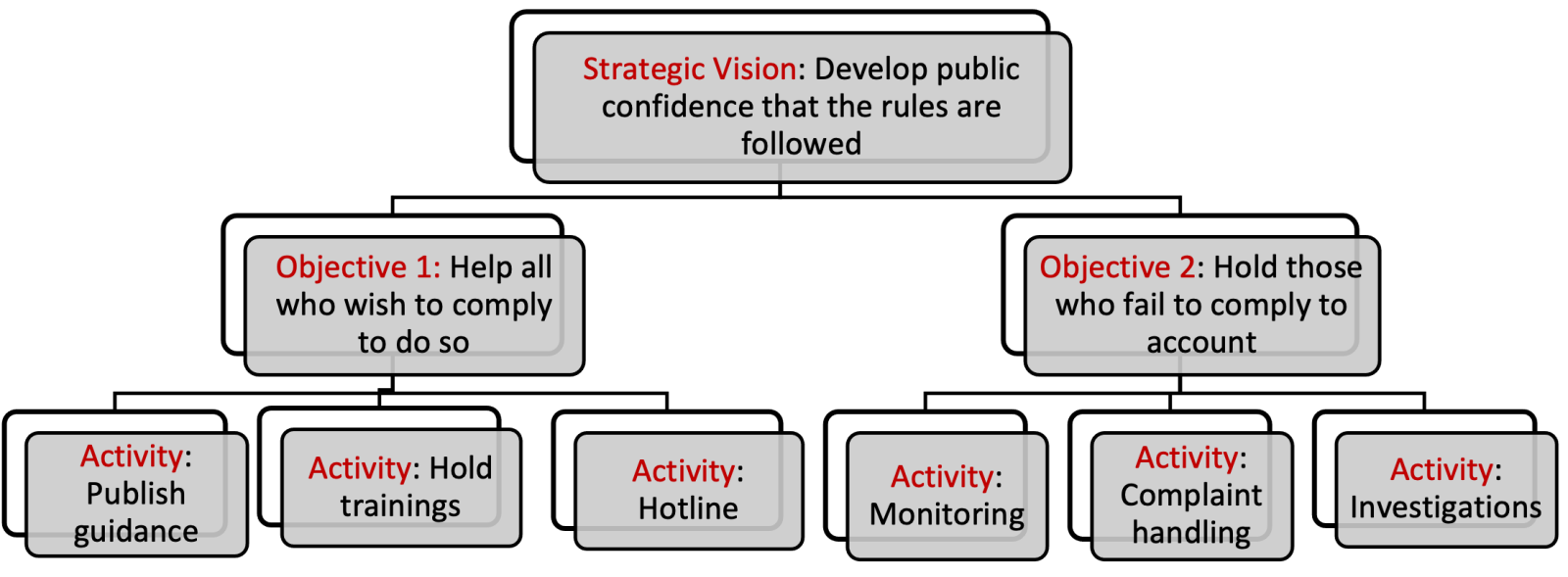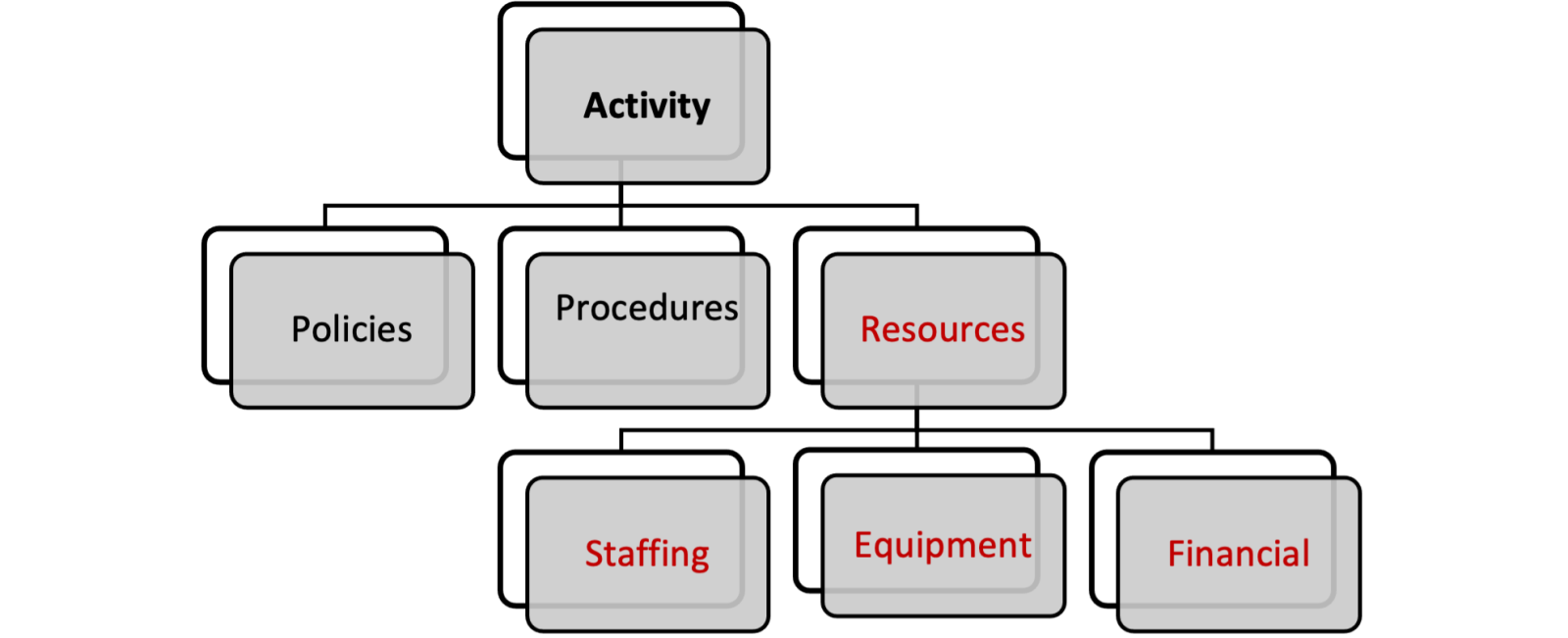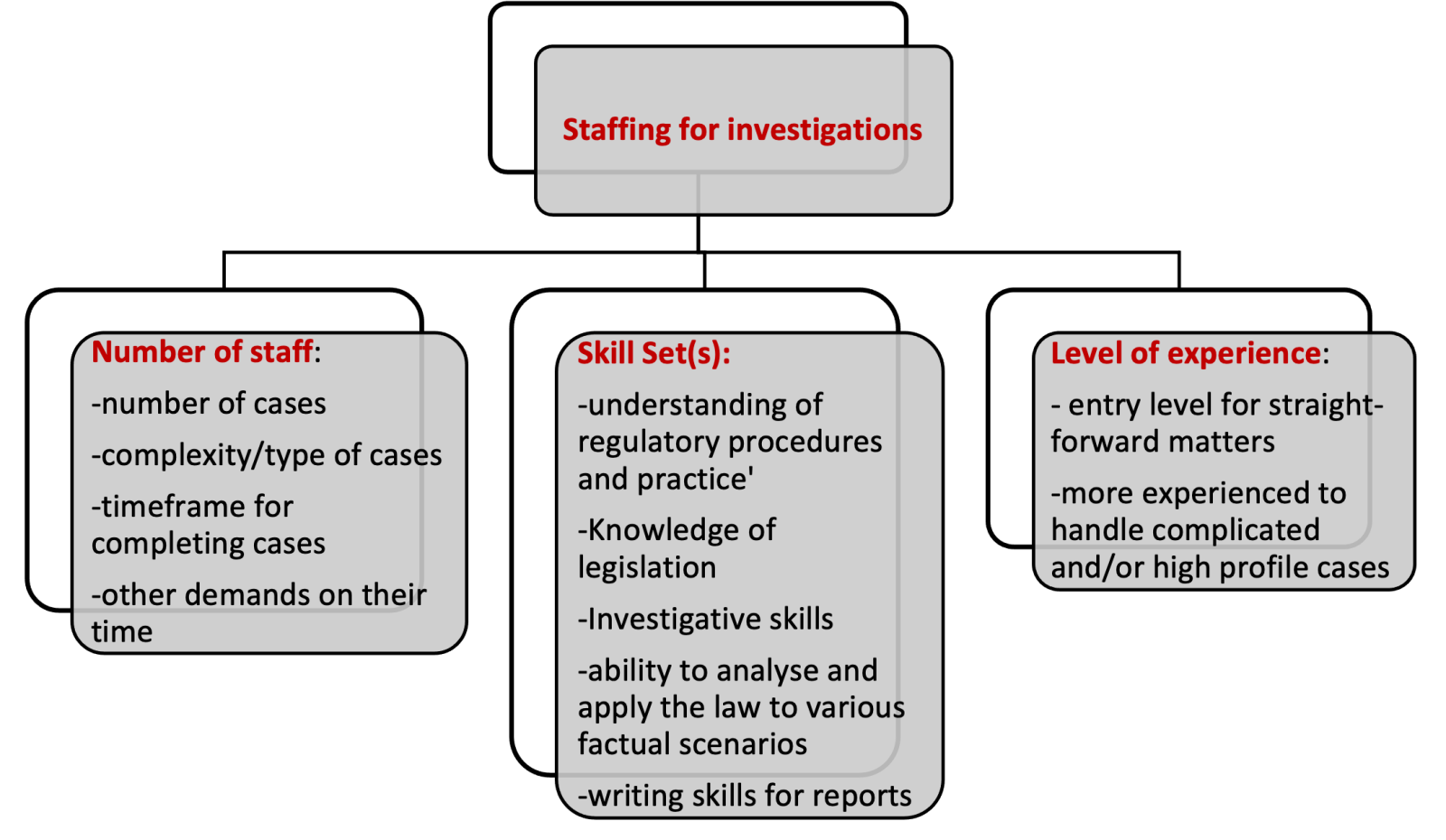3.4 Ensuring Appropriate Resources to Deliver the Oversight Institution's Role
In developing your strategic framework and setting out your vision and objectives, you will need to consider about how you will deliver that strategy. This means identifying the activities you will undertake, given your financial capacity and budgetary constraints, and then ensuring that the activities are properly resourced.
By way of illustration, let’s assume that your strategic vision is to ensure that the political finance rules are complied with. Let’s further assume that you set two key objectives to deliver that vision: first, to help all who wish to comply to do so and second, to hold to account those who fail to comply with the law. Some activities that might flow from this are shown below:
Once you have identified all desired activities, you will need to think about the various tools required for successful implementation of each one. It may be helpful to group these tools into three categories as shown in the diagram below. The first two, policies and procedures, clearly are important tools. In addition to policies and procedures, you will also need to consider the requisite resources - human resources (staffing), material resources (equipment) and other financial resources.
Resorting once again to our hypothetical scenario, we can explore the resourcing component further by focusing on one of the identified activities: investigations. When considering your staffing requirements, you will want to consider the number staff members, the requisite skill sets and the required level of experience/expertise. Considerations relevant to determining the number of staff needed will require you to make assumptions about the number of cases to be investigated, the type of violations involved, the anticipated complexity of the cases, any set timeframes for completing cases and whether staff members will have other assignments to handle alongside their case work. The desired skill set(s) would likely include: the ability to understand and interpret legislation; a knowledge of regulatory procedures and practices; investigative skills such as the ability to conduct interviews and to draft requests for documents; the ability to audit financial records and follow a financial trail, the ability to analyze factual scenarios and to apply the law to them; and the ability to write reports of findings and conclusions. You may also want to consider what level of experience would be optimal. Clearly, if the oversight body is called upon to investigate senior politicians or other high-profile matters, it will be important to have staff with considerable experience. See further here.
Regarding the type of equipment that might be necessary to resource the investigation function, much will depend on your country context. For example, transportation needs may be met best by having a dedicated vehicle in some countries but totally inappropriate in others. There may be a need for secure storage of documents and other evidence. And, if you wish to record interviews, then some form of recording device and possibly a transcription service will be required.
The required amount of other financial resources will also vary from jurisdiction to jurisdiction. In some countries, witnesses who attend interviews are entitled to payment of expenses and perhaps a set witness fee. There may be a need to retain experts (e.g. an IT expert, auditing experts etc). And, if you are dependent on airplanes or other paid forms of transport, provision for such costs should be made in your resource envelop. The important point is that you give due consideration to the type of out-of-pocket expenses you are likely to incur in undertaking your investigative activities and ensure that they are budgeted for.
3.4.1 Structural Models for Political Finance Oversight
Depending on the structure of your institution, you may have a dedicated department dealing with political finance monitoring and oversight or rely on your (legal) department to take on this task, or you may have a few core staff assigned to political finance who are assisted by employees from other departments.
There is no one model that will fit all jurisdictions. Much will depend on factors such as the scope and breadth of your remit, the number of political actors you are required to regulate and their level of experience and sophistication. It may also be relevant whether your institution is in a start-up phase or having to implement significant legal changes. However, where the functions are split across various departments, certain challenges can arise. Staff from other departments, for example, may feel less ownership of the political finance work and less invested in it. In addition, it can be difficult to develop internally a consolidated view of how the system works and to create a unified message that can resonate both internally and externally.
3.4.2 Resourcing Issues and How to Address Them
There are several common resourcing issues that political finance institutions may confront in some form or another depending on country context.
In some countries, governmental financial support for the oversight body simply is inadequate to allow it to succeed in delivering its core responsibilities. This may be the result of competing financial priorities but can also represent a deliberate attempt to financially starve the oversight agency and thus neutralise its impact. This is an area where public pressure from the outside, in the form of civil society organisations and the press, can help. One mechanism that has been tried is a multiyear budget for the oversight institution to try to prevent budget retribution by the government in power for decisions it does not like. Another approach is to include a provision in law that provides a structured formula for setting the budget. Whilst both approaches guarantee a minimum budget, they can make it even more challenging for the oversight institution to obtain additional funding, even if legitimately needed.
The political finance workload is often cyclical, peaking in the run up to elections, around the time financial reports are submitted to your institution and during the period when review them. Therefore, it is recommended that you have a workforce or staffing plan in place to set out how you intend to resource your delivery during these known peaks, i.e., as regards the number of staff needed, their specializations and level of experience.
Your workforce plan may be simple and focus mainly on retaining/ increasing the staff you need to fulfil your role during these peak periods. Depending on the structure of your institution, you may want to hire additional staff members or to recruit external rapporteurs/ persons to help with the monitoring process for a limited amount of time. In France, the oversight institution recruits around 200 rapporteurs during the pre-election campaign period who are not employees but work for the Commission nationale des comptes de campagne et des financements politiques (CNCCFP) on a temporary consultancy basis. They are tasked with the first phase of control and their role is to facilitate the control process by flagging violations/ breaches at an early stage. The CNCCFP’s legal department also increases its staffing by recruiting lawyers and/or accountants for 6 to 8 months to help with the review and checking of financial reports. The budget is therefore increased in years where elections are held.
Your workforce planning may also become more complex during transitional periods. For example, you may need to shift your staffing complement or structure to meet the demands of new legislation that significantly changes or augments the work you need to undertake (e.g., extending your remit to cover candidates and not just political parties, new regulations for non-contestant campaigners or monitoring of spending on social media, or rules that confer a role for your oversight body in the fight against abuse of state resources). Or you may be on the verge of implementing a new technology (e.g. an e-filing/reporting database) that could alter your staffing needs.
Finally, it can be challenging to find staff with prior experience relevant to political finance, particularly in countries where political finance regulation is a relatively new area. Political finance regulation differs from other enforcement regimes, such as health and safety. It requires both sensitivity to fundamental freedoms of political participation and a strong will to defend the democratic process from corrosive influences in an area where the stakes are very high. This, coupled with the need for staff to be (and to be perceived to be) impartial can present significant challenges. It may lead you to consider additional training and development opportunities to offset a lack of prior experience amongst staff members.







